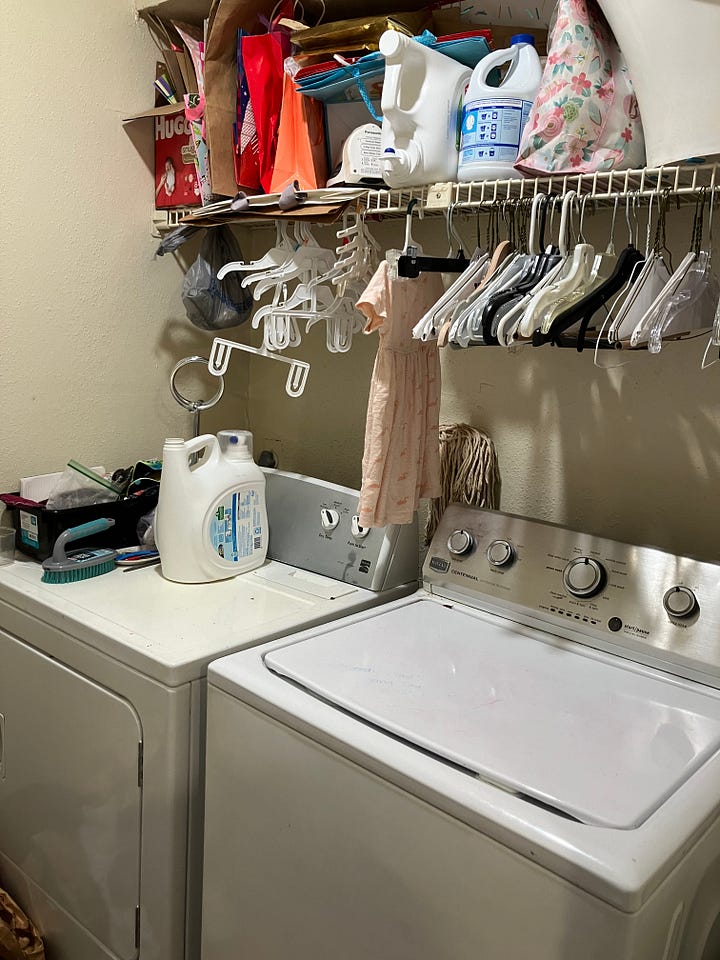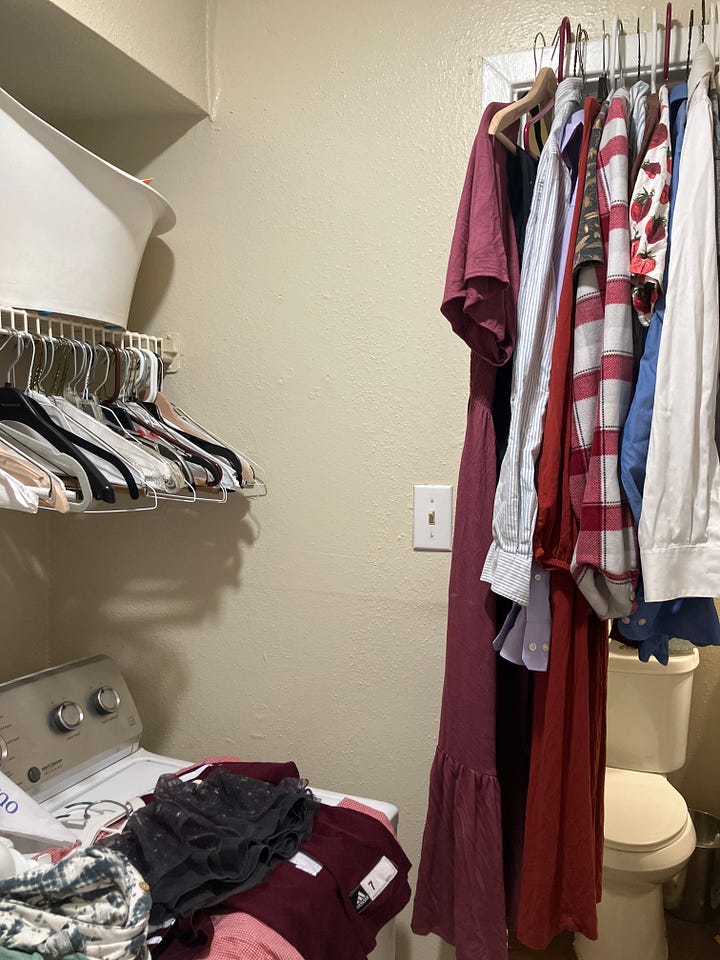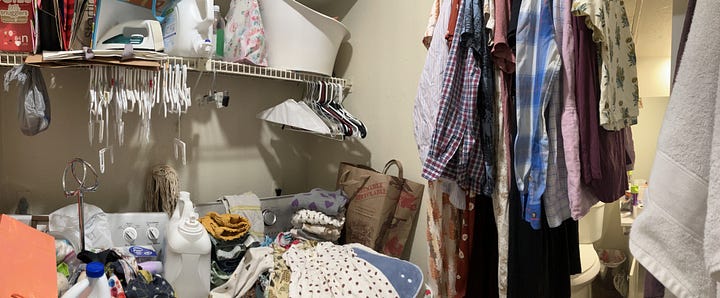dismantling Mt. Clean Laundry
and my shame, and the patriarchy in my head

Isn’t it funny how we come to attach so much emotional value to things like housework?
I’ve been pondering this a lot lately, first because of
’s excellent piece on homemaking, and second because of Mt. Clean Laundry, which is what I call the pile of clean cloths sitting on the floor in front of my dryer, waiting to be folded. I’ve mentioned MCL before, and I’m happy (and surprised!) to mention that, at least as of the time of writing, it has significantly decreased both in size and in emotional significance.Let’s back up a bit. Over the summer, I read a book called how to keep house while drowning. It’s a short, accessible volume designed for those with limited attention and unlimited overwhelm. The author makes a point to start the book with a reminder that tidiness—or lack thereof—doesn’t constitute a moral judgement on our worth as individuals. Cleanliness is next to Godliness, as they say, but this doesn’t mean that we are failures or worthless or deserving of bad things simply because our homes don’t look like the model rooms at IKEA.1
From there, she walks through a series of small changes, process suggestions, and permissions with the goal of helping you get un-stuck and eventually helping you find routines and habits that serve you well.
That, in my mind, is the key takeaway from the book: your space is designed to serve you. Your home exists for you, not you for your home. And you have the freedom to completely change the way things are done in your home to ensure that your space is functional. Reading the book almost feels like talking with a therapist. Her suggestions are out of the box, and she really gets you thinking about what you actually want to do with the set-up of your home.
For example, if you’re a mom of young children and you do most of the selecting clothes and dressing, do you really need or want to store everyone’s clothes in separate rooms? Would it make your life easier to set up a big family dresser in one place, or a mini clothes station with a stash of basics, so that you can get everyone dressed in the same place at the same time?
Obviously, that specific solution isn’t for every family, but you get the idea. By looking at the things you actually need to do, the place and manner in which you currently do those things, and the emotional significance of doing or not doing them, you can come up with creative solutions that will help minimize your internal resistance and decision fatigue, while maximizing your efficiency and executive function.
It occurred to me recently that, since our laundry room has the same wire shelving as our closets, there’s no reason why I can’t just hang all the empty hangers above the washer and dryer so that I don’t have to move hanging clothes to a secondary location before sorting and hanging them. Since that epiphany, I have hung all the clothes that I’d washed over the last several weeks (months?) and put them away. We are no longer living exclusively out of Mt. Clean Laundry!! And while I’ve been at it, I’ve utilized the flat surface of our top-loading washer as a folding table, selecting for one storage location or clothing type at a time (my pajama drawer, kids’ tops, James’ socks, hand and kitchen towels). This has allowed me to break the project up into smaller steps—folding a dozen hand towels and putting them away feels much more achievable than folding and putting away two months’ worth of laundry across two bedrooms and a bathroom.
Accomplishing even this small portion of the task has dramatically lessened my shame around it and has helped me feel less “stuck” in my laundry routine. Instead, I’m feeling curious and asking questions.
The reality of life with two kids under three—as many of you know—is that your days are not your own, and sometimes the timing of tasks just doesn’t work out. Maybe the dryer takes longer than the washer, so you end up with a mildewy smell and an endless cycle of re-washing things. Maybe as soon as the clothes are dried and moved to the bed to fold them, it’s time to wake the baby up, and by the time you get back to the pile, you’re so tired that you just shove the clean clothes on the floor and they get mixed up with the dirty clothes so you just wash everything again. Maybe it’s that you get the clothes folded, but only during naptime when the kids’ dresser is inaccessible, so the folded clothes get set aside and forgotten about.
This is where I’ve been: There’s been a jam somewhere in the process. What I’m doing isn’t working. And the not-working is causing a lot of shame, which reduces even further the likelihood that I will complete the task before it feels insurmountable.
But this experience has me thinking. Instead of ruminating on those perceived failures and allowing those judgments to shape our sense of self, let’s act like detectives. Picture a situation in your home or family life where you feel stuck or ashamed, then ask yourself: “Where is this process getting jammed? What circumstance—time, location, emotion, or otherwise—is causing the jam? And how can I side-step that circumstance entirely?”
Where is this process getting jammed?
My laundry process is getting jammed in between drying the clothes and folding them. Thus, Mount Clean Laundry is reincarnated regularly.
What circumstance—time, location, emotion, or otherwise—is causing the jam?
Because I can get a load started or moved over in five minutes or less, it is easy for me to step in, do what needs to be done, and go about my day even when the girls are fussy or I’m exhausted. But folding and putting away require more time and space (including a wide space to fold AND access to the specific spaces where clothes are stored) that are difficult to find. When I start, I rarely get to finish, and when I don’t get to finish, I get frustrated with the girls or discouraged. Often, I decide that I don’t have time or energy or patience to fold the clothes, but I need the dryer empty so the wet load doesn’t start to smell. I dump the clean clothes on the floor of the laundry in the meantime, with vague plans of folding and putting away “later”.
The jam then causes emotional distress—I feel ashamed of being unable to keep up with the task I have agreed to complete. I know James often feels frustrated when he can’t find the clothes he needs for the girls or when I haven’t washed a load of his clothes recently and something essential is unavailable before he leaves for work. I begin to tell myself—with no evidence whatsoever—that he believes all kinds of negative and terrible things about me. I externalize my low self-esteem, which validates it and makes it feel stronger and more important.
The bigger the pile gets, the more unlikely it is that I’ll complete it on my own. It becomes too big of a task to complete in one sitting. This leaves me with a couple of options:
Send James and the girls to the park on a weekend so I can have some designated chore time. Hope and pray I have enough time and enough self-discipline to follow through and tackle the whole pile.
Recruit a friend to share childcare and/or chore duty with. Either we swap watching one another’s kids while the other does some work, or we send the husbands out with the kids and work together on a large project.
Ask James to help me while we watch a movie together in the evening.
Each of these choices presents additional logistic difficulties and additional slices of humble pie, and I’m not a huge fan of either, so I tell myself that the clean clothes pile is working for now (teeeeeeechnically true, but not really) and I ignore it.
And how can I side-step that circumstance entirely?
If I can break the folding down into a task that is either of shorter duration or less dependent on location (or both!) then I’ll be able to scale it to the time I have available and the space(s) I can access. Having a designated clean laundry “hub” removes the shame and stigma of “a pile of clean clothes getting soiled again from sitting on the dirty floor”. Instead, I can say that I choose to place my clean clothes in a specific, out-of-the-way location so that I can manage the task more efficiently. Adding a bin or basket in the place where the clean laundry pile currently resides would lend validity to this idea. Hanging all the empty hangers in the laundry room and clearing off the top of the dryer would allow me to turn the space I have into the folding station I want—don’t even need to wait for a dream house to move into. Now I have a start-to-finish, one-stop-shop set-up for doing laundry. Choosing to fold only one type or location of item at a time gives me flexibility to only fold what I have time to fold, allows me to step away and tend to a child when needed (without leaving a mess on the bed or couch that I’ll have to deal with later), and lets me avoid folding kid clothes during hours when I will be unable to put kid clothes away. Having hangers available means I will be able to prep and remove hanging clothes from the “pile” easily and transfer them to the closet without making a million trips back and forth.
Going a step further, could I put out some bins or jars or tiny trash cans to collect washed tissues, hair balls, dryer lint, and spare change? That way, I don’t have to leave those things on the floor or in a helter-skelter pile that inevitably ends up back in the pile of clean clothes…
To be sure, if I’m not careful, this line of thinking leaves the realm of the plausible (brainstorming) and enters the realm of the ideal (dreaming). There’s certainly a time for both in the life of any woman, but for the purposes of this exercise, our goal is to stay firmly rooted in what is possible in this moment. Maybe I don’t have the money to buy a new three-section rolling laundry cart (or the space to store it!)—the baskets I have will do. Maybe my kids can’t yet do their own washing—but I can teach them where to put their dirty clothes. Maybe I don’t really need another cute trinket from Etsy—I’ve got some old bowls and baskets lying around that will work just as well.
Do you see where we’re going with this?
We’re inviting ourselves to ask some important questions here, and to answer them without condemnation or scorn. We’re giving ourselves a chance to detach our identity from our perceptions of our actions.2 And once we’re no longer seeing ourselves as the sum of our weaknesses and failures, we can begin to strategize and implement incremental and meaningful changes as we move toward functionality and virtue.
Now, to be upfront with y’all, it hasn’t been very long since I started operating like this. I can’t say for sure whether or not this system will last, whether it will work, whether it will solve all my emotional tangle around my self-worth and my laundry habits.
But I can tell you that I feel hopeful for the first time in months.
Pivoting just a little bit, I don’t think it’s a coincidence that this breakthrough happened during the follicular phase of my cycle. This is the phase when a woman’s body is preparing her uterus for a possible pregnancy, but has not yet ovulated. There is a certain amount of “tidying” or “housekeeping” or “preparation” that is happening within her. It seems reasonable enough to assume that this attitude would transfer out into the world she is interacting with.
Put differently, I have certainly noticed a correlation between my cycle and my mood: during menstruation, I’m desperate to get rid of things we don’t use or need or want; during my follicular phase, I’m motivated to clean, to tidy, to create a stable chore routine; during ovulation, I’m confident and outgoing and more hospitable than usual; during my luteal phase, I’m tired and moody and want to seclude myself away.
On my period, the laundry pile left me craving a good purge—get rid of it all, embrace a capsule wardrobe, minimize the amount of washing that needs to get done in the first place and shorten the “maximum time between loads”. But as my body moved into a tie of preparation, the laundry pile left me feeling motivated, creative, competent: let’s figure out a way to make this space functional, to reduce its emotional impact.
I couldn’t make this stuff up, y’all.
If you spend enough time in the fertility awareness world, you’ll encounter the concept of cycle syncing: matching your [diet, workouts, social calendar, you name it] to the phase of your cycle that you’re in at any given time. For some women, this is done with the goal of balancing hormones for overall health or trying to achieve a pregnancy. For others, it’s a way of honoring their body and maximizing the health benefits of the choices they’re making. I’m sure there are many reasons for cycle syncing as there are women, although to be perfectly honest, I find the concept overwhelming.
But I wonder sometimes if women of old—before feminism, before the pill, before life became so individualized and atomized and lonely—synced their housework with their cycle, consciously or otherwise. Did they accomplish interpersonal tasks during their ovulation days? Do a deep-clean while in their follicular phase? Take a rest where possible during menstruation?
I wonder what it would look like to account for my cycle in my plans for housework.
There have been some great ideas thrown my way lately regarding chores—
has a chore deck and draws a new card each day; rolls a ten-sided die to decide which room to clean. I agree with them that the element of randomness adds a pull that a simple “chore chart” doesn’t—and yet I struggle to stick with it.Now I’m wondering if maybe, just maybe, the key for housework for me is to try some kind of cycle syncing. To lean into the deep cleaning when my body is primed for it, and to set those tasks down without guilt it’s not. I don’t know that this would work for everyone. Not every woman needs this rhythm, this cyclical approach to chores, but I like it for me. It’s intriguing. It’s new. It’s something I haven’t tried before.
And—and I’m sorry if this is a hot take—it leaves me questioning whether the expectations and cultural knowledge for housework have changed in a post-pill world, where women can exist in a sort of fertility limbo, not truly in any phase of their cycle, sometimes for years at a time. Modern life, for all its perks and drawbacks, expects women to function like men—consistent, available, unchanging. With no cycle, no fluctuating hormones, no predictable (albeit often frustrating) mood shifts, we should be able to do the same chores at the same time on the same day of the week over and over until we die.3 And we flagellate ourselves when we can’t live up to this standard.
Is this what people mean when they talk about internalized misogyny? That we, even as women, default to the expectation that what is happening in our bodies will not affect what we do with our bodies? That we somehow think it’s reasonable for our bodies to both be female and also act or behave or respond in a way that is deeply un-female?4
Is this the patriarchy??5
(It is difficult for me to understand how modern feminism can be built on the pill and yet refuse to acknowledge and honor this basic embodied reality of womanhood. It seems to me that feminism in its modern, extreme form is contributing to these male-centric expectations, rather than combatting them to nurture honor and respect for the female body.)
This is something I want to un-learn. This attitude—that my body does not matter, that it is something to be ignored or conquered or overcome at all costs—does not serve me well. It does not allow me to honor myself as made in imago Dei, and it does not empower me to make a gift of myself to my family.
So here’s to dismantling our piles of clean laundry, our shame about our dirty homes, and the patriarchy that lives rent-free in our minds.
I want to hear from you! How do you keep house while drowning? How do you dismantle the voice of shame or rewrite the story you’re telling yourself? How do you live out your cycle?
Some pictures of our in-progress laundry situation!




There are some excellent quotations from the book available at goodreads if you’re interested in getting a sense of the book’s overall tone.
This post from a few weeks ago is a long read, but one I’m really proud of and would really love to share with you. It touches on a lot of topics that overlap with this week’s reflections.
Caveat here: of course, even without the pill, not every woman cycles normally—whether that’s because of pregnancy, nursing, menopause, PCOS, endo, PTSD, athletic activity, etc etc. But I think (I hope!) we can talk about a “normal” experience of womanhood in a way that doesn’t carry moral judgment against those whose bodies are not cycling.





I loved this post.
Last year I discovered Mystie Winckler’s Simply Convivial blog and membership. It helps me not drown :)
She is all about beating perfectionism. The very first thing you learn in her membership is to “start with ten minutes.” You literally set a timer for ten minutes, do a task you’ve been procrastinating, and stop when the timer goes off.
She is also really big on “alignments” which is a Christian version of affirmations. For example, I have an alignment about what kind of wife, mother, Christian, and parishioner (some vocations I identified for myself) I am. (Joyful, happy, fun, antifragile, strong, lighthearted, friendly, etc) I read this to myself every morning, along with a lot of others and they really help to get me in a good headspace, especially because I’m not a morning person at all, lol.
As for the cycle, I read a few books about that a few years ago and was interested in the idea of matching my activities/expectations for myself to the various phases, but for whatever reason gravitate more towards just being flexible on a day-by-day basis. I also do a weekly review every week to prepare for the following week, which allows me to build in a lot of flexibility, based on what we have been doing, my energy level, and what we have planned.
Once again, loved the post! 💕
I wonder, Sara, if instead of thinking of cycle syncing as something else to optimize (because oh my gosh, is productivity actually the most important thing?) it would serve many of us better to simply have an awareness that we might need to adjust our expectations and offer ourselves some compassion at certain times. Sometimes just knowing, “huh, it’s my luteal phase and I have a huge to-do list written out, that’s probably setting myself up for a crash and burn”. Even aside from my menstrual cycle, I’ve had to learn what I can expect. If I am an absolute rock star with productivity one day, I know to expect that I will get about half of what I hope for done the following day. Once I put the pattern of “up day is always followed by down day” together it allowed me to stop beating myself up so much for not operating that way all the time. Most days are sort of in between, and it’s not realistic to expect to function at peak performance when the baby has been cutting teeth for a week 😆